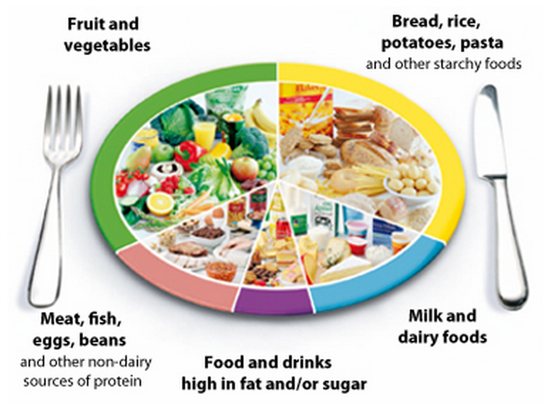The Eat Well Plate
The eatwell plate highlights the different types of food that make up our diet, and shows the proportions we should eat them in to have a well balanced and healthy diet.
It's a good idea to try to get this balance right every day, but you don't need to do it at every meal. And you might find it easier to get the balance right over a longer period, say a week. Try to choose options that are lower in salt when you can.

Eating healthily is about eating the right amount of food for your energy needs. In England, most adults are either overweight or obese. This means many of us are eating more than we need, and should eat and drink fewer calories in order to lose weight.
Based on the eatwell plate, try to eat:
- Plenty of fruit and vegetables: Did you know that we should be eating at least five portions of a variety of fruit and veg every day?
- Plenty of potatoes, bread, rice, pasta and other starchy foods: Choose wholegrain varieties whenever you can, or eat potatoes with their skins on for more fibre.
- Some milk and dairy foods: Go for lower-fat milk and dairy foods. These are healthier options to help you get enough protein and calcium.
- Some meat, fish, eggs, beans and other non-dairy sources of protein: These are important sources of protein, vitamins and minerals, and form part of a healthy balanced diet.
- Just a small amount of foods and drinks that are high in fat or sugar: Cut down on fat and sugar by eating fewer sweets, cakes and biscuits, and drinking fewer sugary soft drinks.
Is the eatwell plate for me?
The eatwell plate applies to most people – whether they're a healthy weight or overweight, whether they eat meat or are vegetarian, and no matter what their ethnic origin.
However, it doesn't apply to children under the age of two because they have different nutritional needs. Between the ages of two and five, children should gradually move to eating the same foods as the rest of the family, in the proportions shown on the eatwell plate.
Anyone with special dietary requirements or medical needs might want to check with a registered dietitian whether the eatwell plate applies to them.